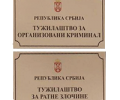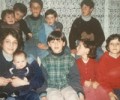With regard to the Judgment by which the Republic of Serbia is obliged to pay compensatory damages to the Bogujevci sisters

On June 7, 2018, the High Court in Belgrade issued a judgment, obliging the Republic of Serbia (RS) to pay compensation for non-pecuniary damages to the total amount of 3.050.000 Serbian dinars (RSD), to the sisters Saranda, Jehona and Lirie Bogujevci (Sisters Bogujevci), severely wounded in the crime committed by the “Scorpions” unit in Podujevo on March 28, 1999. The Humanitarian Law Center (HLC) considers that the trial in this case lasted for an intolerable length of time, and that the amount of compensation awarded was inadequate in relation to the serious injuries sustained by the sisters Bogujevci in this crime. On 28 August 2018, with the HLC’s support, the Sisters Bogujevci filed an appeal with the Appellate Court in Belgrade, within the statutory deadline of 15 days after the judgment was received.
On March 28, 1999, members of the “Scorpions” unit shot and killed 14 Albanian civilians in the Gashi family’s backyard in Podujevo – seven children aged two to 15, and seven women. Five children from the Bogujevci family – Saranda, Lirie, Jehona, Genc and Fatos – survived the shooting, although severely wounded. For this crime, five members of the “Scorpions” unit were sentenced to multiple years of imprisonment before a domestic court. The “Scorpions” unit was part of the Special Anti-Terrorist Unit of the Ministry of Internal Affairs of Serbia (MUP), and according to the Law on Obligations, the Republic of Serbia was responsible for the damage that its state authorities (in this case the MUP) did in the course of its work.
In this regard, members of the families of the civilians killed in Podujevo started two procedures for the compensation of non-pecuniary damage against the RS. None of these two procedures, even after more than 11 years, has been finalized. The first procedure was initiated in 2007 by members of the families of the persons killed against the RS, for the non-pecuniary damages caused by the death of close family members. In 2015, the Court issued a judgment awarding compensation to the total amount of 25.9 million dinars to the 24 closest relatives (parents, spouses, brothers, sisters and children) of fourteen Albanian women and children who were killed, as non-pecuniary damages for the mental suffering caused by the death of a close person. However, even as much as 11 years since the filing of the lawsuit, this judgment has not been validated, and the case has been filed on appeal before the Appellate Court for the last two years.
The second procedure for compensation for non-pecuniary damages was initiated by the Sisters Bogujevci in 2008 for the physical pain, reduction of life-long physical activity, enduring fear and mental pain that they suffered because of this crime. Ever since then, the Sisters Bogujevci have been trying to exercise their right to fair compensation before the local court for damages committed by the organs of the RS. Namely, since the beginning of this procedure, the Sisters Bogujevci have been exposed to extremely inappropriate actions by the institutions of Serbia. They gave their first testimonies in December 2008 before the First Municipal Court in Belgrade, when they spoke in detail about the crimes they had survived, and the numerous operations and long-term treatment they had had to undergo, as well as the consequences they still suffer. Owing to the establishment of a new network of courts and the insistence of the trial judge, two years from the first testimony, the sisters Bogujevci were forced to repeat their testimony again in 2010, although there was no need for that, since they had already given their detailed statements in 2008. By doing this, the Sisters Bogujevci were exposed not only to the unnecessary cost of coming to Serbia from the UK where they live, but also to repeated traumatization, as they had to give the details about the crime they survived and the consequences they are facing today.
It was only ten years later, in June 2018, that the Higher Court in Belgrade finally delivered a first-instance judgment by which the Sisters Bogujevci received compensation for non-pecuniary damage to the total amount of 3.050.000 dinars for the non-pecuniary damage committed by the Serbian MUP members. The Court established the existence of a causal link between the crimes committed by members of the “Scorpions” unit and the fear and physical and mental pain suffered by the Sisters Bogujevci. However, although a causal link has been established, the HLC considers that the amount of the compensation awarded does not correspond to the injuries sustained by the Sisters Bogujevci. Namely, the aim of awarding a fair compensation for non-pecuniary damage is not to establish the situation that existed before the damage was caused, as this is not possible at all, but to provide a certain satisfaction to the victims. In this regard, when awarding a fair compensation, the court is obliged to take into account the protected good that has been damaged and the purpose for which the compensation is awarded.
If it is taken into account that the Sisters Bogujevci were minors at the time of the crime (they were 13, 10 and 8 years old), that a large number of their family members were killed in the crime, that they themselves suffered serious injuries that required long-term treatment, and that the consequences still persist today, the HLC assesses that the amount of the compensation awarded is a lump sum and does not provide an adequate satisfaction for the injuries sustained. By awarding such a low amount of damage compensation to the injured parties, the courts in Serbia deny the aim of compensation for non-pecuniary damage, at the same time as undervaluing the suffering the Sisters Bogujevci survived as children.
With the HLC’s support, the Sisters Bogujevci have filed a complaint with the Appellate Court in Belgrade within the legal deadline, requesting that the court awards compensation for non-pecuniary damage respecting the principles of righteousness and justice, as well as the standards of the European Court of Human Rights.







